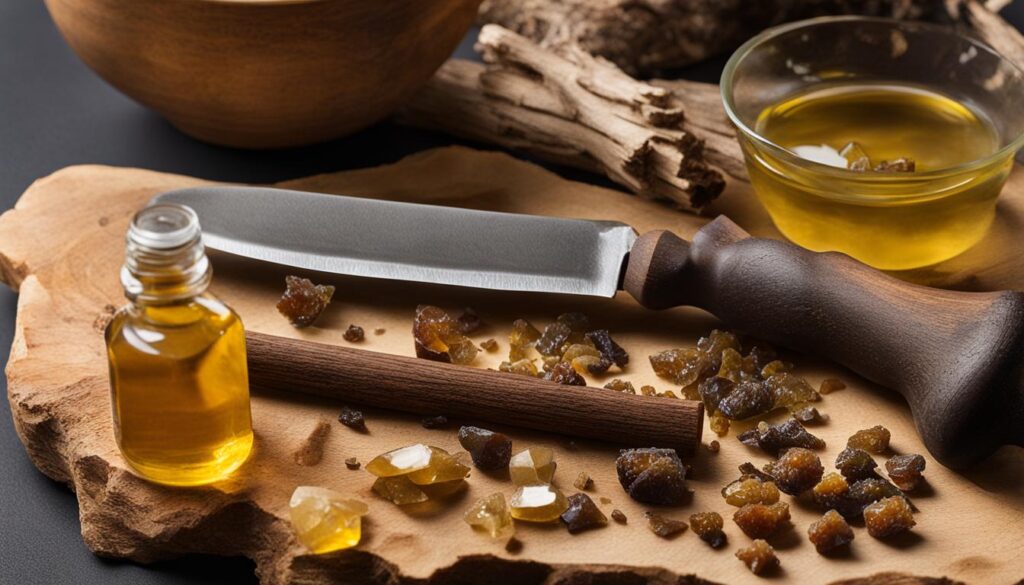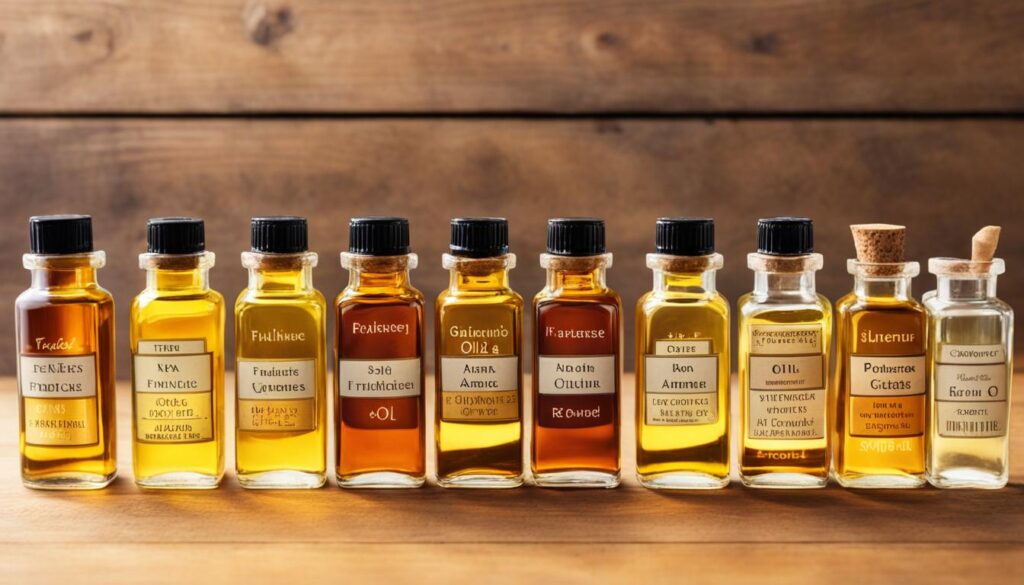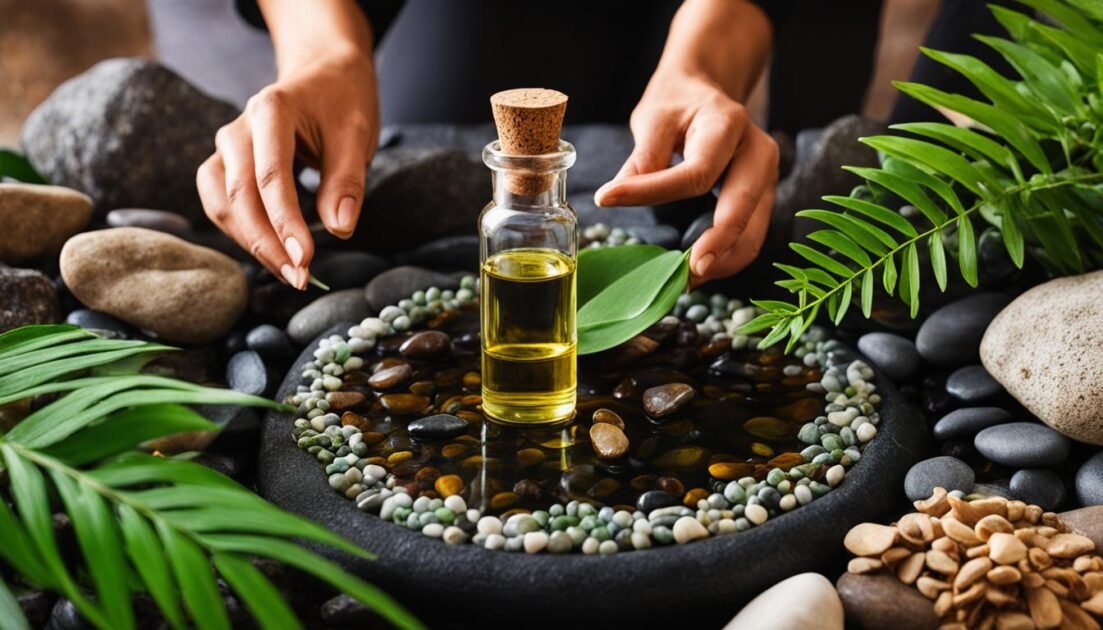Frankincense oil, derived from the dried resin of the Frankincense tree, offers a myriad of benefits for holistic health. With its woody, earthy, and spicy fragrance, this essential oil has been treasured for centuries for its therapeutic properties. From skincare to immune support, the uses of frankincense oil are extensive and diverse. In this holistic health guide, I will delve into the various benefits and ways to incorporate frankincense oil into your wellness routine.
Frankincense oil has been shown to possess remarkable anti-inflammatory, astringent, and cytophylactic qualities. It promotes the growth of new cells, effectively reducing the appearance of wrinkles and helping heal wounds. Additionally, it offers sedative properties, making it a valuable tool for relaxation and stress reduction. This versatile oil can also be used cosmetically, medicinally, and even as a natural remedy for respiratory and digestive ailments.
Are you curious to learn more about frankincense oil’s history, extraction process, and the different varieties available? Or perhaps you want to explore the contraindications and proper usage guidelines to ensure a safe and enjoyable experience? This holistic health guide covers it all, equipping you with the knowledge needed to embrace the benefits of frankincense oil fully. So let’s dive in and discover the wonders this ancient oil has to offer.
Key Takeaways:
- Frankincense oil offers numerous holistic health benefits, ranging from skincare to immune support.
- It has anti-inflammatory, astringent, and cytophylactic properties, making it valuable for reducing wrinkles and promoting wound healing.
- Frankincense oil possesses sedative qualities that aid in relaxation and stress reduction.
- It can be used cosmetically, medicinally, and as a natural remedy for respiratory and digestive issues.
- Stay tuned for detailed information on frankincense oil’s history, extraction process, varieties, contraindications, and proper usage guidelines.
History of Frankincense Oil

Frankincense has a long and fascinating history that stretches back to ancient times. This aromatic resin has been highly prized for its therapeutic properties and was widely used in various cultures for both religious and medicinal purposes.
In ancient times, frankincense was considered a precious and valuable commodity. It was often used in religious rituals and ceremonies, where its rich and potent aroma was believed to have a purifying and sacred significance.
Extracting frankincense oil is achieved by collecting and drying the resin from the Boswellia tree. The resin is carefully harvested by making incisions in the tree bark, allowing the droplets of resin to dry and harden on the tree. The dried resin is then scraped off and further processed to produce the essential oil.
This essential oil has a long history of traditional use and has been valued for its healing properties. It has been utilized in traditional remedies for a variety of ailments, including respiratory conditions, skin issues, and digestive problems.
Frankincense has been used throughout history for its healing properties and aromatic fragrance. Its rich history and cultural significance make it a truly remarkable natural remedy.
Today, frankincense oil continues to be highly regarded for its therapeutic benefits. It is used in aromatherapy, skincare products, and natural remedies for its soothing and rejuvenating effects. The remarkable properties of this ancient oil continue to be embraced and appreciated in modern times.
In the next section, we will delve into the various benefits that frankincense oil offers for holistic health and well-being.
Benefits of Frankincense Oil

Frankincense oil offers a multitude of benefits for both physical and mental well-being. With its unique properties, this essential oil has been utilized for centuries to promote overall health and vitality.
Reduces Anxiety and Stress
The therapeutic benefits of frankincense oil include its ability to reduce anxiety and stress. The calming aroma promotes a sense of relaxation and tranquility, making it a valuable tool for managing daily stressors.
Stimulates the Immune System
Frankincense oil is known for its immune-boosting properties. It helps strengthen the body’s natural defenses, making it more resilient against common pathogens and promoting overall wellness.
Diminishes Signs of Aging
One of the remarkable benefits of frankincense oil is its anti-aging effects. With its cytophylactic qualities, the oil promotes the growth of new cells, reducing the appearance of wrinkles and fine lines, and leaving the skin looking youthful and radiant.
Heals Wounds
Frankincense oil possesses potent healing properties. It aids in the wound healing process, supporting the regeneration of damaged tissue and reducing the risk of infection.
Anti-inflammatory and Astringent Properties
Due to its anti-inflammatory and astringent properties, frankincense oil is beneficial for various skin conditions. It helps soothe inflammation, reduces redness, and tightens the skin, resulting in a healthier complexion.
Eliminates Surface and Airborne Bacteria
Frankincense oil possesses antimicrobial properties that can help eliminate surface and airborne bacteria. This makes it a valuable addition to natural cleaning products, promoting a clean and healthy environment.
| Benefit | Description |
|---|---|
| Reduces Anxiety and Stress | Promotes relaxation and tranquility |
| Stimulates the Immune System | Strengthens the body’s natural defenses |
| Diminishes Signs of Aging | Reduces the appearance of wrinkles and fine lines |
| Heals Wounds | Aids in the regeneration of damaged tissue |
| Anti-inflammatory and Astringent Properties | Reduces inflammation and tightens the skin |
| Eliminates Surface and Airborne Bacteria | Helps create a clean and healthy environment |
Extracting Frankincense Oil

Frankincense oil is obtained from the resin of the Boswellia tree through a process of drying and distillation. To extract the oil, incisions are made in the tree bark, allowing the resin to flow out. These droplets are then left to dry on the tree, forming hardened resin. Once dried, the resin is carefully scraped off and further processed to obtain the essential oil.
The quality of frankincense oil depends on various factors such as the climate, environmental conditions, and the period of harvesting. Each element contributes to the unique aroma and therapeutic properties of the oil.
Uses of Frankincense Oil

Frankincense oil is a versatile essential oil with a wide range of uses. From skincare to natural remedies, this oil has been valued for its therapeutic properties.
1. Skincare: Frankincense oil is known for its benefits in promoting healthy skin. It can reduce the appearance of wrinkles and scars, improve skin tone, and promote the healing of wounds. When applied topically, it can be used in facial serums, moisturizers, and body lotions. Its anti-inflammatory properties can soothe irritation and redness, making it a valuable addition to your skincare routine.
2. Aromatherapy: Add a few drops of frankincense oil to a diffuser or vaporizer to create a calming and relaxing atmosphere. Its earthy and woody aroma can enhance mood, reduce stress, and promote relaxation.
3. Respiratory Support: Frankincense oil has been used for centuries as a natural remedy for respiratory conditions. Its expectorant properties can help alleviate symptoms of asthma, bronchitis, and colds. Simply diffuse the oil or add a few drops to a bowl of steaming water for inhalation.
4. Digestive Aid: When diluted with a carrier oil, frankincense oil can be applied topically to the abdomen to support digestion. It can help alleviate symptoms such as bloating, indigestion, and stomach cramps.
5. Natural Disinfectant: Frankincense oil has antimicrobial properties that make it an effective natural cleaner and disinfectant. You can add a few drops to homemade cleaning solutions to help eliminate bacteria and germs.
Overall, frankincense oil offers a range of benefits for skincare, health, and holistic well-being. Its versatility and natural properties make it a valuable addition to your essential oil collection.
Frankincense Oil Varieties

Frankincense oil comes in different varieties, each with its own unique properties and benefits. Let’s explore some of the most common varieties:
1. Frankincense Carterii
Frankincense carterii is the most popular variety of frankincense oil. It is known for its immune-boosting properties and its benefits for skin health. This versatile oil can be used topically to promote healthy-looking skin and support overall wellness.
2. Frankincense Frereana
Sourced from the highlands of Somalia, frankincense frereana is highly regarded for its healing properties. It has been traditionally used for its soothing effects on the skin and muscles. This variety of frankincense oil is often used in skincare products and massage therapy.
These are just a few examples of the varieties of frankincense oil available. The choice of variety depends on the desired use and the specific benefits sought.
| Variety | Main Benefits |
|---|---|
| Frankincense Carterii | Immune-boosting, beneficial for skin health |
| Frankincense Frereana | Healing properties, soothing for the skin and muscles |
Contraindications for Frankincense Oil

While frankincense oil is generally safe for use, it is important to be aware of potential contraindications and take necessary precautions. These contraindications are especially relevant for certain groups of individuals, including pregnant women and those with bleeding disorders.
Pregnant women: Frankincense oil has blood-thinning properties, which can be potentially harmful during pregnancy. It is recommended that pregnant women exercise caution and consult with a healthcare professional before using frankincense oil.
Bleeding disorders: Due to its ability to thin the blood, frankincense oil should also be used with caution by individuals with bleeding disorders or who are taking anticoagulant medications. It is advisable to seek medical advice before incorporating frankincense oil into their routine.
Additionally, it is important to consider any known allergies or sensitivities to essential oils before using frankincense oil. While rare, some individuals may experience allergic reactions or skin irritations when using essential oils, including frankincense oil.
As with any new product, it is recommended to perform a patch test before applying frankincense oil to the skin. This can help identify any potential adverse reactions and allow for adjustments or avoidance if necessary.
History and Cultivating Frankincense

The history of frankincense spans thousands of years, making it an ancient and revered substance. This aromatic resin has been cultivated and valued for its fragrance, as well as its medicinal and religious uses.
The Boswellia tree, the source of frankincense, is native to regions such as Africa and the Arabian Peninsula. Cultivating frankincense involves the careful and skilled process of harvesting the resin from the tree.
“Frankincense has been used for centuries for its various benefits and has played a significant role in cultural practices.”
To obtain the resin, incisions are made in the bark of the Boswellia tree, allowing the sap-like resin to ooze out. Over time, the resin hardens and forms tear-shaped droplets on the tree.
The harvesting of frankincense is a labor-intensive task that requires specific environmental conditions. The process is typically carried out by skilled individuals who have inherited the knowledge and techniques from previous generations.
The Cultivation Process
The cultivation of frankincense involves the following steps:
- Incisions are made in the bark of the Boswellia tree.
- The sap-like resin seeps out and forms droplets on the tree.
- The droplets are left to dry on the tree, forming hardened resin.
- The hardened resin is carefully scraped off the tree.
- The resin undergoes further processing to extract the precious frankincense oil.
This intricate and traditional process ensures the quality and purity of frankincense, preserving its therapeutic properties.
Importance of Frankincense Cultivation
The cultivation of frankincense has been a vital cultural and economic activity in regions where the Boswellia tree grows. The resin has been traded for centuries, serving as a valuable commodity.
Furthermore, the cultivation and harvesting of frankincense support local communities, providing employment opportunities and sustaining traditions and cultural practices.
The history and cultivation of frankincense reveal the deep-rooted significance of this precious resin, its diverse applications, and the profound impact it has had on various cultures throughout time.
How to Use Frankincense Oil
When it comes to utilizing the benefits of frankincense oil, there are several effective methods to consider. The choice of application depends on the desired effects and individual preferences.
One common way to use frankincense oil is through diffusion. Simply add a few drops of the oil to a diffuser and let the aroma fill the air. This method is perfect for creating a relaxing and calming environment, promoting a sense of tranquility and well-being.
For topical use, it is important to dilute frankincense oil with a carrier oil, such as coconut or jojoba oil, before applying it to the skin. This ensures safe usage and reduces the risk of irritation. Gently massage the diluted oil onto the desired area, whether it’s for skincare purposes, such as reducing the appearance of wrinkles, or for soothing sore muscles.
If you’re looking for a luxurious and indulgent experience, you can add a few drops of frankincense oil to your bathwater. The warm water will release the aromatic properties of the oil, creating a spa-like atmosphere and helping you unwind.
It is important to note that if you plan to use frankincense oil for medicinal purposes, it is recommended to consult a healthcare professional for guidance. They can provide specific dosage instructions and ensure that it is suitable for your individual needs.
To ensure the best results, always purchase high-quality, pure frankincense oil from reputable sources. This guarantees the oil’s effectiveness and safety, allowing you to fully experience the numerous benefits it offers.
FAQ
What are the benefits of using frankincense oil?
Frankincense oil has numerous benefits, including promoting relaxation, boosting the immune system, reducing signs of aging, and supporting skincare.
What is the history of frankincense oil?
Frankincense oil has been used for thousands of years, dating back to ancient times. It was highly valued for its aroma and was used in religious rituals and traditional remedies.
How is frankincense oil extracted?
Frankincense oil is obtained by drying and distilling the resin of the Frankincense tree. The resin is collected from the tree bark and processed to extract the essential oil.
What are the different uses of frankincense oil?
Frankincense oil can be used for skincare, promoting relaxation, supporting the immune system, and as a natural remedy for respiratory and digestive conditions.
Are there different varieties of frankincense oil?
Yes, there are different varieties of frankincense oil, each with its own unique properties. The most common ones are frankincense carterii and frankincense frereana.
Are there any contraindications for using frankincense oil?
Pregnant women and individuals with bleeding disorders should exercise caution when using frankincense oil due to its blood thinning effects. It’s also important to check for any allergies or sensitivities before use.
What is the history of frankincense and how is it cultivated?
Frankincense has a rich history and has been cultivated for thousands of years. The resin of the Boswellia tree is harvested by making incisions in the bark, and specific environmental conditions are required for successful cultivation.
How should frankincense oil be used?
Frankincense oil can be diffused, applied topically after proper dilution, or added to bathwater. It’s important to follow dilution guidelines and consult a healthcare professional for medicinal use.






